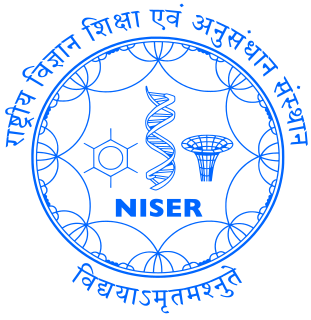
The Indian Institute of Science (IISc) is a public, deemed, research university for higher education and research in science, engineering, design, and management. It is located in Bengaluru, in the Indian state of Karnataka. The institute was established in 1909 with active support from Jamsetji Tata and thus is also locally known as the "Tata Institute". It is ranked among the most prestigious academic institutions in India and has the highest citation per faculty among all the universities in the world. It was granted the deemed to be university status in 1958 and the Institute of Eminence status in 2018.

Anurag Kumar was the Director of the Indian Institute of Science at Bangalore, India from 2014–2020. He is a professor at the Department of Electrical Communication Engineering, and has served as the Chairperson of the Electrical Sciences Division at the Indian Institute of Science, before being appointed as the Director in 2014.

The National Institute of Science Education and Research (NISER) is an autonomous premier public research institute in Jatani, Odisha, India under the umbrella of Department of Atomic Energy, Govt. of India. The institute is a constituent institution of Homi Bhabha National Institute (HBNI). The prime minister, Manmohan Singh (2004–2014), laid the foundation stone on August 28, 2006, establishing the institute along the lines of the IISc in Bangalore, and its seven sister institutions, the IISERs, established at Kolkata, Pune, Mohali, Bhopal, Berhampur, Tirupati and Thiruvananthapuram in India.

Kishore Vaigyanik Protsahan Yojana (KVPY) was a scholarship programme funded by the Department of Science and Technology of the Government of India, aimed at encouraging students to take up research careers in the areas of basic sciences. It offered scholarships and contingency grants up to the pre-Phd level to selected students. Begun in 1999, it was administered by the Indian Institute of Science.

Indian Institute of Science Education and Research, Mohali is an autonomous public university established in 2007 at Mohali, Punjab, India. It is one of the seven Indian Institutes of Science Education and Research (IISERs), established by the Ministry of Human Resources and Development, Government of India, to research in frontier areas of science and to provide science education at the undergraduate and postgraduate level. It was established after IISER Pune and IISER Kolkata and is recognised as an Institute of National Importance by the Government of India. It promote research in various fields of science.

Indian Institute of Science Education and Research, Pune is an autonomous public university established in 2006. It is one of the seven Indian Institutes of Science Education and Research, and was one of the first IISERs to be established along with IISER Kolkata. It is located in the city of Pune, India.

Indian Institute of Science Education and Research, Thiruvananthapuram is an autonomous public university located in Thiruvananthapuram, India. The institute is one of the seven IISERs established by the Ministry of Human Resource Development, Government of India, to bridge the gap between research and basic sciences' education at the undergraduate level. The six other IISERs are IISER Bhopal, IISER Kolkata, IISER Mohali, IISER Pune, IISER Tirupati and IISER Berhampur. All IISERs were declared as Institutes of National Importance by the Parliament of India in 2012 through the NIT Amendment Act.

Indian Institute of Science Education and Research, Bhopal is an autonomous public university in Bhauri, Bhopal district, Madhya Pradesh, India. It was established by the Ministry of Human Resource Development, Government of India in 2008 in order to incorporate research in basic science at undergraduate and graduate level, with equal emphasis on higher education for research and education in science. It is an autonomous institution awarding its own degrees.

Indian Institute of Science Education and Research Kolkata is an autonomous public university in science and education field located in Mohanpur near the town of Kalyani in Nadia district, West Bengal, India. It was established by the Ministry of Human Resource Development in 2006 and promoted to the status of an Institute of National Importance in 2012 vide the NIT Amendment Act. It is one of seven Indian Institutes of Science Education and Research, and was the first of the IISERs to be established along with IISER Pune. It is considered to be one of the leading institutes of India in terms of research output, and was ranked fifth in the country by the Nature Index. Bidhan Chandra Krishi Viswavidyalaya(BCKV) & MAKAUT are other nearby Institutions.
Dibyendu Nandi is an Indian space scientist known for his studies related to Solar Magnetic Cycle. He is associated with Montana State University, Harvard-Smithsonian Center for Astrophysics and IISER Kolkata where he carried most of his research work. He currently is the Head and Coordinator of the Center of Excellence in Space Sciences India (www.cessi.in) which was established by the Ministry of Human Resource Development, Government of India at IISER Kolkata.
Kerala Science Congress is an annual gathering of Kerala-based scientists and scholars organised by Kerala State Council for Science, Technology and Environment (KSCSTE) for revitalizing Research and Development activities in Kerala and to identify new talents in scientific research in Kerala. KSCSTE is an autonomous body constituted by the Government of Kerala. The gathering features talks by invited scientists, presentations of research papers and awards of various prizes.
Karavaan is the annual socio-cultural science fest of the Indian Institute of Science Education and Research, Pune. The name stems from the notion of all IISERs moving forward as one. The fest attracts students from colleges all across Pune, as well as national institutes all over India. It is a 3-day fest, held either in October or November in the Fall semester every year.
Dipankar Das Sarma, popularly known as D.D. Sarma, is an Indian scientist and structural chemist, known for his researches in the fields of Solid State Chemistry, Spectroscopy, Condensed Matter Physics, Materials Science, and Nanoscience. He is a former MLS Chair Professor of Physics and Chairman of the Centre for Advanced Materials and the GAST Professor of Uppsala University, Sweden, A recipient of TWAS Physics Prize and the UNESCO Biennial Javed Husain Prize, Sarma was honored by the Council for Scientific and Industrial Research (CSIR), Government of India, in 1994, with the Shanti Swarup Bhatnagar Prize for Science and Technology.
Gondi Kondaiah Ananthasuresh is an Indian mechanical engineer and Professor at the Department of Mechanical Engineering, Indian Institute of Science, Bengaluru, India. He is best known for his work in the areas of Topology optimization, Compliant mechanism and Micro-Electro-Mechanical Systems (MEMS).

Mimamsa is a national level intercollegiate science quiz organized by IISER Pune. It was started in 2009 based on the ideas of Dr. Sutirth Dey, a Faculty Founding Member from biology department. It aims at creating a unique set of questions that focus on concepts and their interdependence. Mimamsa strives to convey the implicit beauty of science. Over the years the means of implementing this philosophy have been honed to give rise to one of India’s toughest science quizzes. The fact that Mimamsa has gained national acclaim and renown is substantiated by the results of the quiz over the years. It has expanded to encompass all major regions of the country.
Sandhya Srikant Visweswariah is a scientist and academic at the Indian Institute of Science, Bangalore, India. She is currently the Chairperson of the Department of Molecular Reproduction, Development and Genetics and the Co-chair of the Centre for Biosystems Science and Engineering, Indian Institute of Science. She additionally holds the position of Adjunct Professor, Faculty of Medicine and Dentistry, University of Bergen, Norway. Her research involves the investigation of the mechanism of signal transduction via cyclic nucleotides, phosphodiesterases and novel cyclases in bacteria. Most recently, she was awarded a Bill and Melinda Gates Grand Challenges Explorations Grant for her proposal entitled "A Small Animal Model of ETEC-Mediated Diarrhea".

Dipankar Chatterji is an Indian molecular biologist and the Honorary Professor at Molecular Biophysics Unit, Indian Institute of Science, a multidisciplinary research institute under the Department of Science and Technology of the Government of India. He is known for his pioneering research on bacterial transcription. He is a recipient of Shanti Swarup Bhatnagar Prize and is an elected fellow of all the major Indian science academies. The Government of India awarded him the fourth highest civilian honour of the Padma Shri, in 2016, for his contributions to science and engineering.
Kumaravel Somasundaram is an Indian cancer biologist and a professor at the Department of Microbiology and Cell Biology of the Indian Institute of Science. Known for his studies on the therapeutics of Glioblastoma, Somasunderam is an elected fellow of all the three major Indian science academies namely, the National Academy of Sciences, India, the Indian Academy of Sciences and the Indian National Science Academy. The Department of Biotechnology of the Government of India awarded him the National Bioscience Award for Career Development, one of the highest Indian science awards, for his contributions to biosciences in 2006.
Ashok M. Raichur is an Indian materials scientist, nanotechnologist and a professor at the Department of Materials Engineering of the Indian Institute of Science, Bangalore. Known for his studies on the use of nanotechnology for biomedical and environmental applications, Raichur is a former Alexander von Humboldt Fellow and a life member of the National Academy of Sciences, India. The Department of Biotechnology of the Government of India awarded him the National Bioscience Award for Career Development, one of the highest Indian science awards, for his contributions to biosciences, in 2009.
Ganesh Nagaraju is an Indian biochemist, geneticist, cancer biologist and a full professor at the Department of Biochemistry of the Indian Institute of Science. He has been studying DNA damage responses in mammalian cells, and mechanisms underlying chromosome instability genetic diseases and cancer. The Department of Biotechnology of the Government of India awarded him the National Bioscience Award for Career Development, for his contributions to biosciences, in 2015. In 2018, Nagaraju received the Shanti Swarup Bhatnagar Prize for Science and Technology in Biological Sciences from CSIR. This award is given in recognition of outstanding contributions to Science and Technology, and is considered one of the highest awards for science in India.











